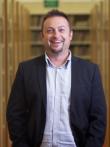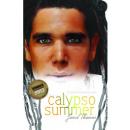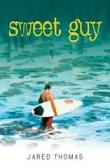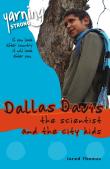AustLit
-
In the sixteenth of this series of interviews, Anita speaks to Jared Thomas.
Jared Thomas is an Indigenous author, playwright, poet, and academic. In 2013 he won the State Library of Queensland's Indigenous Writing Fellowship (black+write!) for his manuscript Calypso Summer, which will be released through Magabala Books in 2014. Jared lives in Adelaide.
-
As a little kid I liked The Jungle Book by Rudyard Kipling and The BFG by Roald Dahl but I didn’t really read many novels when I was young. I read a lot of magazines, National Geographic, bmx and surf mags and that type of thing.
I started reading novels when I was about fifteen, mostly for school. I was just turning seventeen when I entered university and had to read a novel a week, the classics, for my English studies and my love of reading developed from this point.
-
During the first year of my university studies I was introduced to African and Caribbean literature and the collection of works on the reading list, including Chinua Achebe’s Things Fall Apart and Olive Senior’s collection of short stories, Summer Lightning and Other Stories had a dramatic impact, especially Olive’s work. These works had such an impact because it was the first time I saw other colonised people of other countries speaking about colonisation, experiences similar to those of Aboriginal people in literary form. These works are studied in courses worldwide due to their articulation of experience and the high degree of literary skill applied by the authors.
-
Fog a Dox by Bruce Pascoe. It’s a wonderful children’s novella. There are a number of dogs in the story that serve as metaphors of ‘race', to discuss the absurdity of how people are regarded and treated according to ‘race’ and furthermore, the complexity of identity.
-
I read Once Were Warriors by Alan Duff when I was in my late teens and found it incredibly confronting and therefore difficult to get through. Although I love Maori literature and learning about Maori culture and experience, I can’t bring myself to watch the film. I shudder just thinking about it. I enjoy a challenging read and over the summer I plan to finish a book that I’ve picked up several times without reading to the end.
-
Olive Senior’s collection of short stories, Summer Lightning and Other Stories, is a book that I read almost annually. It serves as a reminder of why I write and I enjoy studying Olive's technical proficiency. I was very fortunate to spend time with Olive as my mentor in 2008 in Jamaica and again in 2010 when she was writer in residence at Adelaide University.
-
Every Australian should read Anita Heiss’s Am I Black Enough For You? The memoir responds to the racial vilification case where journalist Andrew Bolt claimed that a group of highly acclaimed Aboriginal people, including Heiss, were using their ‘supposed’ Aboriginal heritage for professional and economic gain. The work details the legal proceedings that followed, the reality for Heiss and other Aboriginal Australians, and confronts racism in a very matter-of-fact and rational manner.
Underpinning the narrative is the story of the love between Heiss’s parents that is very touching and serves as an exemplar, although one not devoid of challenges, of intercultural relationships.
I also place Peter Carey’s The True History of the Kelly Gang on this list. Hetti Perkins gifted it to me in 2001 and it alerted me to class struggle - the fact that it is not only Aboriginal people who have endured persecution in this country.
-
Of all art forms, why literature?
-
I had played music since a kid and in high school played in our school Aboriginal rock band. We played music by bands like Coloured Stone and Midnight Oil. In combination with learning about the experiences of the older generations of my family, it assisted my politicisation.
I started writing to confront racism, to put the experience of my family members and ancestors and other people in the picture. I wanted to play my part in setting the story straight.
I first started writing theatre after watching Funerals and Circuses by Aboriginal playwright Roger Bennett. The play is about racism in a small rural town. When I watched the play it was like the world opened up for me. I had found my medium and once I committed to it, writing seemed like the most natural thing I could do.
-
In addition to studying literature as an undergraduate, I completed a Graduate Diploma, a Master's and a PhD in Creative Writing and have attended many workshops and writing conferences to learn about the craft and business of writing. I intend to undertake many more similar professional development opportunities.
-
I am most comfortable when writing. It’s a very selfish pursuit much of the time. I go into my happy place. I feel like I’m surrounded by a warm glow. Apart from the selfishness of it, I love reflecting the experience of people who aren’t featured in the majority of works available and enjoy seeing their response to this work.
-
A good writer brings a complex time, place, phenomena or situation to life in a digestible, comprehensive way. Their writing propels the reader through the work. Taking this into consideration Witi Ihimaera is one of my favourite authors on the basis of The Parihaka Woman, Sherman Alexie for The Absolutely True Diary of a Part-Time Indian, and Anita Heiss for Am I Black Enough for You? (memoir) The works by these novelists are certainly ones I would recommend, knowing that they are truly engaging.
-
My key writing role model is singer songwriter Paul Kelly. He writes in a different medium but there’s much to be learned from the way he encapsulates experience.
Anita Heiss is certainly someone setting the pace and example as an Australian writer. She is dedicated to the craft and business of writing, and sharing this knowledge like no other writer that I am aware of.
-
I’ve been working on a play, novel, short story or poem since I was seventeen years old. My process begins by giving the idea a lot of thought.
Because I mostly write about Aboriginal or, more specifically, Nukunu people or experience, whether this be fact or fiction, I speak with other Nukunu or associated Aboriginal people about what I want to write and why before setting pen to paper. Once the concept is in place and initial consultation and approvals have occurred, I undertake research which consists of reading/viewing other works dealing with similar subjects and delving deeply into the socio/political and cultural, including pop culture, elements in which the story is set.
-
Is it difficult to move between genres?
-
As mentioned, Olive Senior served as my mentor when writing the initial draft of the novel Calypso Summer, that will be released in early 2014. As part of the mentorship I spent a month in Jamaica working with her. Olive won the Commonwealth Writers' Prize for Summer Lightning and Other Stories, and was Jamaica’s first female journalist. She is now in her 70’, energetic, very fit and still producing and publishing highly regarded work.
I asked Olive about what it was like working in an industry and country synonymous with cigarette smoking, drinking and drug smoking. Olive simply said that as a writer your tool is your mind and you need to protect it. I’m far from perfect but I’d be a lot worse off without Olive’s advice.
There’s so much romanticism and association with alcohol and drugs tied up with writers but at the end of the day good works depend upon sheer hard work. There’s many writers that gained success while being drinkers or drug takers but went on to write their best works in sobriety. I believe that whatever assists a person in their writing, the drive and creativity is something obtained as children. It just happens to find its way out and some of us get a bit spooked by that or scared that it will dry up.
-
Read as much as you can and listen to as many authors speak about how they go about their writing as possible. In regards to publishing, place your work into the hands of as many people in the industry as possible, beginning with writing competitions. It is also important to know the publishers in your genre and the works that are being published within that genre because that is the standard you are competing with. Persevere.
You might be interested in...








